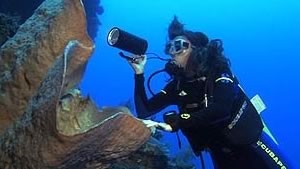 |
| Cristina Diaz, exploring the world of sponges |
Cristina Diaz, Ph.D., is a Research Fellow at the Institute of Marine Sciences at the University of California in Santa Cruz, California.
Cristina Diaz began her career in the 1980s at the Universidad Central de Venezuela in Caracas where she became absorbed in the study of tropical sponges and their life cycles. In the 1990s, she moved to the United States and by 1996 had received her doctorate in organismal biology from the University of California, Santa Cruz.
Diaz is one of a handful of experts in the world specializing in studying, identifying and classifying intertidal and tropical sponges. She has named numerous species and even has one named after her, Halicnemia diazae, a smooth white sponge from the Galapagos Islands discovered by her colleagues. Diaz admits the moniker is indeed an honor, although she confides that the little sponge is quite a weird one.
In addition to her research, Diaz works with Save Our Shores, leading groups of school children on beach cleanups and tours in Santa Cruz. Connecting with the community has been very satisfying for Diaz, especially her educational interactions with students from the Spanish-speaking community -- a group typically with less resources than others. She looks forward to involving more Spanish-speaking people in environmental work in the future.
How did you choose your present profession?
I grew up very close to the sea. Every single weekend and vacation, I spent by the ocean, always swimming, sometimes sailing, snorkeling. At 15, somebody put a tank on me and took me for a dive. There was too much beauty to be ignored.
When I finished high school, all I wanted to do was to be a biologist and to learn languages. I studied biology in Venezuela, and when it was time to select a research project, we realized that nobody knew anything about sponges there. A friend and I embarked on a study of sponges from the coral reef of Los Roques National Park. That was 20 years ago, and the sponge wonderings have not finished.
What would you recommend for students wanting to pursue a similar career?
I would recommend to never get discouraged. To follow their interests, their hunches, their desire to inquire, to explore, and to communicate. There are many aspects of life sciences that await to be discovered, there are other aspects that require lots of research and work to be understood. There are issues that only can be solved, stories that only can be told once somebody dedicates time and energy on them.
If you like organisms, find a group that is little known, or find a problem species (invader, indicator species). Check on local organizations or institutions, volunteer, get exposed to the work people are doing so you can connect both with the natural world, and with the world of scientists carrying on the research.
And remember do not give up. People might think that this type of career does not make sense in the Global Market, but I tell you this type of career is important for Global Survival.
What do you like the best of your profession?
That I get to explore, discover, to spend a lot of time observing, and that I get the chance to "tell the story." I like to inspire other people, to let them know what is out there that they would have not discovered on their own.
What web sites and references would you recommend for viewers interested in your work that was featured in The Shape of Life series?
References:
Diaz, M.C. and Rützler, K. 2001. Sponges an essential component of Caribbean Coral Reefs. Bulletin of Marine Sciences. (In press).
Diaz, M.C and Ward, B.B. 1997. Sponge-mediated nitrification in tropical benthic communities. Mar.Ecol.Prog. Ser.156:97-107.
Page created on 3/18/2006 7:32:05 PM
Last edited 10/17/2019 8:14:53 PM
